5 Tips to Become a Pickleball Pro This Year
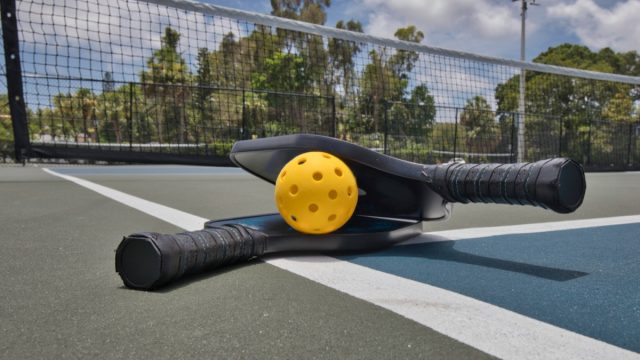
Pickleball: It’s the sensation sweeping the nation. If you haven’t heard mention of this viral sports trend, it’s pretty much badminton, tennis, and ping-pong all meshed together, per the USA Pickleball website. The sport’s spike in popularity is thanks to its simple concept and easy pickup pace for beginners, the website says, and it’s also accessible for players of all ages. If you’ve already hit the court—or if you’ve been meaning to give it a try—experts have a few tips for how you can become a pickleball pro this year.
But before you step onto the court, it’s interesting to note that, while it’s now becoming a mainstream hobby, pickleball dates back to 1965, when it was invented by “three dads,” Joel Pritchard, Bill Bell, and Barney McCallum, looking to entertain their kids. It’s had a resurgence in both the recreational and competitive spheres, allowing you to play with a partner in doubles or command the court on your own in singles. Whichever option you choose, experts have recommendations for how you can up your game. Read on for their top five pieces of advice.
READ THIS NEXT: Exercising Vigorously for 20 Minutes a Day Adds Years to Your Life, New Study Says.
1
Find a pickleball mentor.
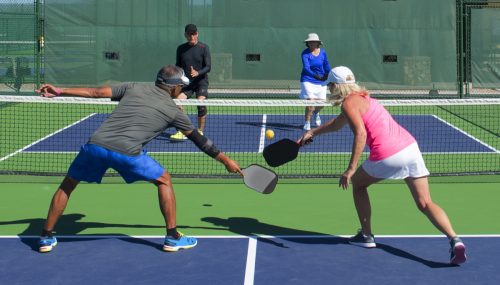
Whenever you’re trying something new, it’s helpful to have someone with background knowledge who can guide you—your own Yoda, if you will. The same goes for pickleball.
According to Rachel Simon, writer, editor, writing teacher, and author of Pickleball for All: Everything but the “Kitchen” Sink, a pickleball mentor is a must.
“All now-great players started off as newbies!” she tells Best Life. “If you want to improve your skills while also getting to know other pickleball fans, head to a court near you and ask high-quality players if they’d be willing to show you the ropes. Chances are, they’ll say yes, as one of the things that sets the pickleball community apart is players’ enthusiasm for introducing others to the game.”
They can also connect you with other players as you continue on your pickleball journey. “Your mentor can not only help you work on your skills, but introduce you to other players, help you find a local club or league, and encourage you to pass on your love of the sport to your own eventual mentees,” Simon adds.
2
Take time on your own.
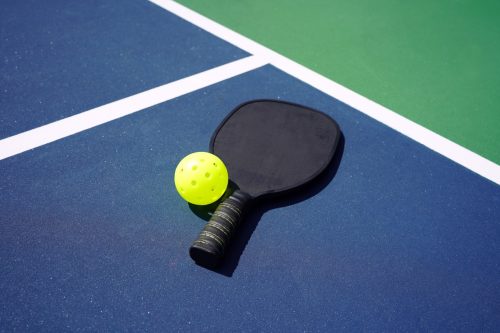
As important as it is to have someone show you the ropes, Mario Musa, founder of TennisRacketBall, says you should also carve out time to practice by yourself.
“Playing alone allows you to focus on specific skills and techniques without the pressure of competition,” Musa, who is also a certified tennis and pickleball player, explains. “Additionally, playing alone can help you to develop a better understanding of the game and how to move on the court.”
During this time, you should practice all of your shots, including serving, volleying, and dinking. “Use this time to work on your footwork and movement around the court,” he recommends, noting that you can also improve your “hand-eye coordination, reaction time, and overall fitness.”
For more helpful advice delivered straight to your inbox, sign up for our daily newsletter.
3
Try dinking.
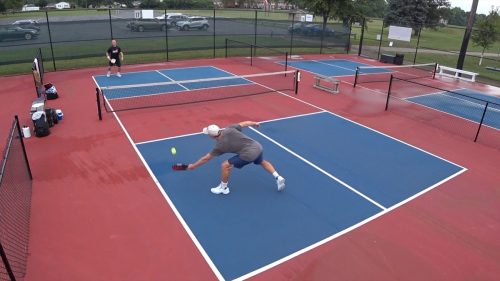
Speaking of “dinking”—that shot should always remain in your back pocket. “A dink gives you time to think,” Brandon Mackie, co-founder and chief revenue officer of pickleball court finder Pickleheads, says. “Unlike hard-hit shots that rely on reflexes, dink shots make the opponent have to work for their next shot due to the lack of power in them. Take that time to reset and anticipate their return.”
Mackie says these soft shots are made in “the kitchen”—the seven-foot non-volley zone that’s in front of the net.
“A dink shot is executed close to the kitchen line and hit with a low arc over the net into the opponent’s kitchen,” Mackie says. “When executed properly, the ball will bounce in the kitchen, making it difficult for the opponent to attack without letting it bounce first.”
Musa also recommends dink shots, as opposed to lobs, which have a high arc. “While lobbing shots can be effective in certain situations, they can also be risky and leave you vulnerable to counterattacks,” he says. “Instead, focus on using shots such as dinks, volleys, and groundstrokes which are safer and more consistent.”
4
Drill, drill, drill.
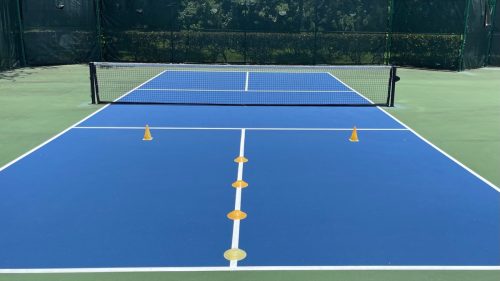
Simon also emphasizes the importance of drilling when it comes to upping your pickleball skills. “You can never get enough practice. Whether alone or with a partner, try out as many pickleball drills as you can, from simple target hitting to more complicated half-court volleys. You can focus on a specific weakness or type of skill, or do a variety—what matters is that you don’t move on until you’ve fully mastered the drill.”
Got some cash to burn? It might be well-spent on a pickleball machine, which you can use for solo drills.
“It’s not always possible for me to rely on others when I want to work on my lobs or practice dinking,” Riley Chervinski, aspiring pickleball pro and founder of pickleball resource website Racket Royalty, tells Best Life. “Having a pickleball machine has been incredibly beneficial for setting up specific drills and practicing the same shot over and over without interruption.”
READ THIS NEXT: Exercising in the Morning Helps Protect Against Heart Disease, New Study Says.
5
Enter tournaments.
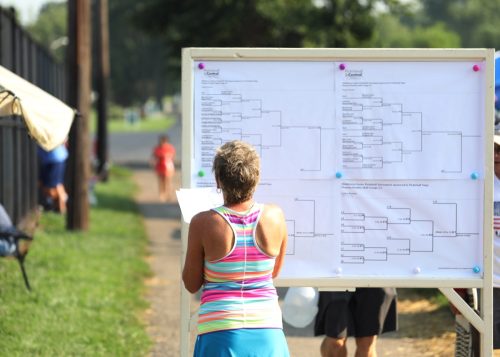
If you really want to get serious with your game, tournaments are a great place to hone your abilities—and you shouldn’t be afraid of entering.
“It’s not as intimidating as it sounds!” Simon says. “Pickleball tournaments are great opportunities to improve your skills and learn from other players, as they’re typically open not just to pros, but players of all levels. Plus, they’re tons of fun, often featuring days’ worth of social activities both on and off the pickleball court.”
Chervinski also notes that going up against players with higher skill ratings can be particularly beneficial. “This was the single change I made that gave me results the fastest,” she says. According to the USA Pickleball Player Skill Ratings rubric, those with a 1.0 to 2.0 rating are beginners with a “minimal understanding” of the rules, while those with a rating of 5.5 or above are “top caliber” players.